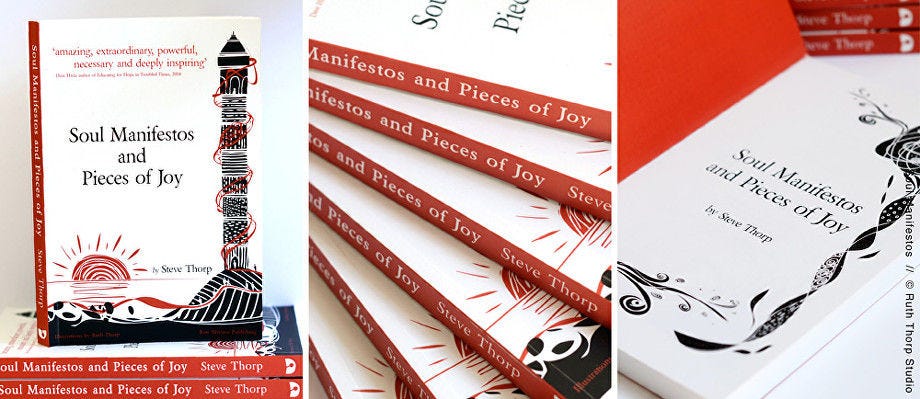Soul Manifestos introduction
In 2014, I published a book of short poetic essays, Soul Manifestos and Pieces of Joy1. The book, illustrated by my longtime collaborator (and daughter) Ruth Thorp, is out of print but has continued to be well received over several editions. We are hoping to re-publish it soon with a new end-piece essay to acknowledge the changes in context over the past decade.
These pieces are written in a similar style to the original small essays in the book – short, poetic and personal – and their content mirrors the concerns that Unpsychology has been addressing in the past decade. You can find the Series Introduction and first ‘chapter’ in this new series HERE. You can find the full series as it grows HERE.
Soul Manifestos 2024/25
#06 : A paradox of self and soul
1. Self and soul
The soul calls individuality to itself – claims it as birthright – creates an entirely unique ‘self’ to represent it in the world. Paradoxically, this self is not special in any way, or above or beyond another. That is to say, each person – self /soul – is special, but none has any more value than another.
Every self is interdependent with every other self; every soul with every other soul, through the common truths of life and existence. ‘Self’ is an other-than-human thing too. If we accept that we are interdependent, interrelating selves, then this includes relating to the individuality of the other myriad lifeforms we encounter and engage with throughout our lives.
In these breaking times, it is more important than ever to be open to this deep truth. Life can seem cheap and transient. Or else, some lives are infinitely more valued than others. Human empires have been created and recreated, sustaining the falsehood of ‘civilised’ and ‘barbarian’ selves, and these distinctions and the inequalities that stem from them leach poison into the politics and ecologies of our times.
The challenges that lie ahead for humans are perhaps greater than any we have faced before. Maybe we could meet them if we were able to draw the best from our individuality and collectivity? There would inevitably be deep shadows cast, and endings to be faced, accepted and mourned. More often though, these days, it seems as if the possibilities for redemption are fading fast.
2. The tree
“…my animal quickness flickers across your slow tree time. Notice me."
In a garden was a tree I spoke with one summer – a few weeks after my Mum had died in 2018. This tree had smooth peeling bark that it shed in wide parchment-like swathes. It was the only tree – the only ‘self’ – I could have spoken with in this way at that time. I would not have been able to share these words with any other being:
I will write this poem on your smooth skin and in that way speak to you Then speak to me; tell me what you grieve for; tell me your slow and ancient longing is this your voice, or mine?
If soul calls individuality to itself, and self, in turn, is about connection, then the paradox of soul-making (if we can still speak of such a task) is held in the tension between the two positions, creating for each of us an ecological mesh in which we are all held (me, you and Tree), and in which we all evolve, grow, develop and die.
My mum was an old woman when she died, but her time was not the slow time of the tree — nor even the flickering animal quickness that we humans find difficult to follow, and often overlook. These small selves we fail to notice live alongside big selves we are in awe of. At our worst, we dismiss the essence of self that emerges at the heart of all human and other-than-human life – whatever we might name them. Yet, how can we be changed, how can we grow to truly know ourselves, if we do not engage with all other ‘selves’ as if they are soulful?
When an old woman dies we feel loss and grief (perhaps even some relief). When a young person dies before their ‘time’ the grief is harder. But a tree or a bird? We don’t know what the tree feels or does when death comes upon it after countless years, only that it dies as the old woman does – ceasing to exist as an individual self.
All dead lifeforms leave something behind. This might be a ripple of memory or a mystery of soul – or something as mundane and tragic as a pile of rubble, or as ordinary as a handful of rotted wood and soil. So, be a slow soul with tree, a quick soul with bird. Be an individual and be the connection. Sit in your place in the web and talk to the world: “Speak to me and tell me what you grieve for; tell me your slow and ancient longing”.2
3. Paradox
Love can be selfish and inward looking. If we love our families but not our neighbours; if we love our home but not the Earth; if we love humanity, but not the other-than-human, then our love and grieving will be partial and self-centred, and our dying will continue to be fearful.
In order to grieve the Earth, we need to learn to love it. And love is as much about connection, attachment and embeddedness, as it is about emotion. It is also about intimate knowledge and discovery — making conscious again what we once knew as children (“children know they are made of the same stuff as grass”, Jay Griffiths memorably wrote3), and what we know deep down as humans who evolved to live and love upon this planet.
Yet, we can treat it (the planet) and each other with such brutality. Or some of us do; those whose strange versions of morality and normality mean they claim the right to plunder, judge and kill with little regard for inevitable outcomes, nor for the lives of other humans and other non-human beings.
These are the men who crave and build empires, those giant entities of human folly, power and destruction. The paradox is that these men are human too and, to some extent, we allow and enable their behaviour. They are capable of ordinary, soulful lives, yet choose to separate out their own selves and souls (and self-interest) from the selves and souls of others. They twist, subvert and break the Golden Rule, with impunity, it seems, as if they had never even heard of its simple, beautiful mutuality and reciprocity.
That is to say, we live in a world of paradoxes and inversions in which the human mind is twisted against itself, and the natural, relational norms of humanity subverted and despoiled.
Soul Manifestos and Pieces of Joy written by Steve Thorp and illustrated by Ruth Thorp is a collection of small, poetic essays written against the backdrop of conflict in modern culture, politics, economics, ecology and psychology. The small manifestos are written for wonder, wisdom, joy, love, and openness - and for the common good. They describe an alternative and grounded response to the material world, a way in which we might live our lives with depth and soul. It was first published in 2014 by Raw Mixture Publishing.
The lines in The Tree are from the poem, I will write this poem on your skin by Steve Thorp, from the pamphlet PoetryMix 2, published by Raw Mixture, 2020.
Kith, The Riddle Of The Childscape by Jay Griffiths. Published by Hamish Hamilton, 2013.







Beautiful words as always. So gentle and compelling!